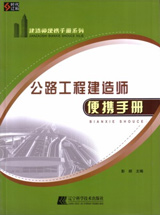
主要责任者: 彭顺
责任方式: 主编
出版者: 辽宁科学技术出版社
出版地: 沈阳
字数: 669 千字
页码: 1-430
开本: 16
中图分类号: U41-62
装帧: 简
语种:中
定价:56.00
出版时间:2009-05
丛书多卷书否:否
书目简介:本册工具书共收录232条词条。
被引频次:2
| 词条 | 公路工程建造师便携手册 |
| 类别 | 中文百科知识 |
| 释义 |  主要责任者: 彭顺 责任方式: 主编 出版者: 辽宁科学技术出版社 出版地: 沈阳 字数: 669 千字 页码: 1-430 开本: 16 中图分类号: U41-62 装帧: 简 语种:中 定价:56.00 出版时间:2009-05 丛书多卷书否:否 书目简介:本册工具书共收录232条词条。 被引频次:2 |
| 随便看 |
开放百科全书收录579518条英语、德语、日语等多语种百科知识,基本涵盖了大多数领域的百科知识,是一部内容自由、开放的电子版国际百科全书。